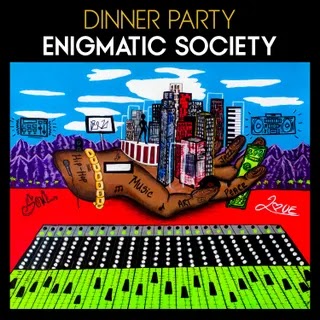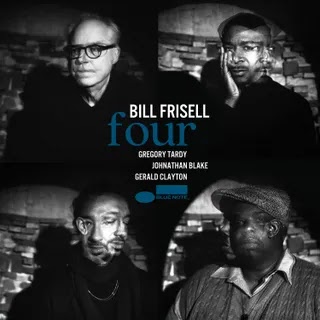The debut album from the virtuosic duo is undeniably accomplished, a smooth but frenetic set aimed at bringing jazz fusion to a new hyper-brained generation.
There’s a video of Thundercat performing “Them Changes” with Ariana Grande, and two youngsters sit behind them. One has a baby blue sweater and plays keys. The other is mounted over drums, forehead cased in a fuzzy raccoon hat. The two play casually at first, then run amok and start wigging out, so fast and dense it’s almost excruciating—meanwhile, Ari is vibing, nodding her head. Taken at Adult Swim Festival 2020, it’s one of many YouTube clips that have helped catapult the zoomer jazz prodigies Domi Louna and JD Beck to internet fame. The comments radiate adulation: The future of jazz! Two alien miracles from outer space!
Domi (22, keys) and Beck (19, drums) communicate preternaturally on their debut record, sculpting blocks and chains of rhythmic architecture for the other to link with. DOMi weaves intricate melodies of bass and piano played ambidextrously. You could mistake Beck for a cyborg; his drums rattle with the controlled ferocity of jungle breaks. Like many young online stars, the duo’s fame outpaced their output. Frenetic live sets and sponsored jam sessions garnered them a sizable fanbase and the respect of folks like Thundercat and Anderson .Paak, who signed them to his Blue Note imprint Apeshit. They had the cosigns. The virality. The skills. All they were missing was an album, or any kind of release at all.
A key part of Domi & JD Beck’s online appeal was the live-time thrill. NOT TiGHT doesn’t try to replicate the magic of a haywire improv experiment pushed to the brink of delirium. It’s undeniably virtuosic but optimized for smooth listening to dazzle the widest possible audience, like a 44-minute display of the brightest neon-shell fireworks on the market. Based on NOT TiGHT’s cover, where the duo appears like doll-cute indie poppers, it feels part of their project is to bring jazz fusion to a new hyper-brained generation. It’s an impressive but fatiguing listen, like nu-jazz-hop played by savants typing 250 wpm, that doesn’t really cohere into something more meaningful than the sum of its very busy and skillfully imbricated parts.
The amalgam of influences and stylistic echoes—from Squarepusher and video game music to ‘70s jazz-fusion like Chick Corea and Weather Report and LA’s beat scene—can be overwhelming. For jazz heads and trained musicians, there’s a treasure trove of inventive drum and keyboard patterns and time signature mayhem to unpack. For the virgin ear, swaths of sweet texture: the dreamy vamp wash of “Duke,” the skittish yet serene pulse of “Moon” with Herbie Hancock on vocoder. “Space Mountain” reminds me of Pokémon Mystery Dungeon music reimagined as hyper-jazz. Everything comes alive here rhythmically: The keys somersault and distort, a cheeky pizzicato peeks its head in every now and then. Beck unleashes a deluge of fitful kick patterns and snare flams that sound like armies of Spirited Away soot sprites scrabbling across floorboards.
As a comic counterpoint to their technical poise, the duo also became notorious for inane antics. At the top of one live set, for instance, Domi broadcasted airhorn and fart noises into the mic. These hi-jinks obviously don’t translate to the record, but a trace of the puerility lingers in the track title “Sniff,” which was originally called “u can sniff my butt.” All of which strengthens the idea that they’re the 100 gecs of jazz. It’s like when you’re so good, you can afford to goof off. That silly side hardly appears on NOT TiGHT; just the odd fleck of folly, like the meandering “Bowling,” where Thundercat drops a Big Lebowski reference and entreats someone to go bowl.
Mostly, though, it's nuanced and mature, with a slickness that sometimes drifts into banality and makes you crave a reprieve in the form of surprise gastric sounds or cavalier testicle jokes. Ignoring the implied imperative in its title, “Take a Chance” stars silky verses from Anderson .Paak and comes across like gratingly inoffensive streambait, while “Louna’s Intro” evokes the sort of milquetoast movie soundtrack you’d hear at a Disney job orientation. It’s in these moments when the project can start to taste like gentrified coffee shop fodder, or two students trying so hard to impress their professors they write something robotically pristine.
Partly the album can feel this way because it’s, well, an album and not a live video. Without the visuals, you might forget Beck’s a human being and not a drum machine, and the drum-key clashes aren’t as cool when you can’t peep them nodding or smiling at each other across the room—micro-movements and quirks (see: pretzel overload) that lent emotional lightness to the matrices of harmonic madness. But the best songs successfully convey that telepathic synergy and friendship, like two humans knotted in such deep sync they dissolve into a single musical organism.
















0 comments:
Post a Comment